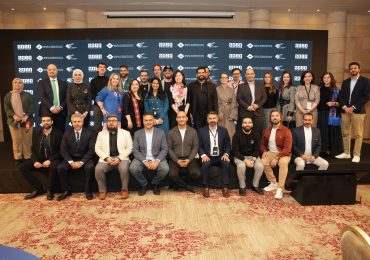Khatia Giorgobiani – Senior Manager of the Business Consulting Department at Grant Thornton
In an era where digital innovation is reshaping industries worldwide, Georgia is no exception. The country’s business landscape is undergoing rapid transformation as organizations adopt digital technologies to stay competitive, improve customer experiences and enhance operational efficiency. However, many leaders in Georgia, particularly those without a technical background, face unique challenges in navigating these changes.
This article explores how non-technical leaders can successfully drive digital transformation initiatives and why their role is essential in the Georgian context.
These statistics highlight the pivotal role and impact of non-technical leaders in driving digital transformation.
- In a recent Grant Thornton survey on the key success factors of digital transformation, business leaders identified the workforce as the most critical element, with 32% prioritizing it over financing (7%) and technology (4%).
- In the Caucasus region, including Georgia, only 38% of companies report having a clear digital strategy, underscoring the need for strong leadership (World Bank, 2023).
- 72% of digital transformation projects fail due to resistance to change and cultural barriers – areas where non-technical leaders excel (Harvard Business Review, 2018).
Georgia’s economy is characterized by a dynamic blend of traditional industries and emerging sectors like fintech, tourism, and logistics. As these industries digitize, non-technical leaders become pivotal in ensuring that digital transformation aligns with organizational goals.
According to McKinsey, 84% of global executives believe digital transformation is critical to business survival (McKinsey & Company, 2018). This is especially relevant in Georgia, where businesses increasingly prioritize digital solutions to compete regionally and internationally. Non-technical leaders bridge the gap between business strategy and technical execution by leveraging their understanding of local market dynamics, regulatory requirements, and customer needs. This enables them to craft strategies that are both innovative and practical.
Digital Transformation: A Necessity for Growth in Georgia
The adoption of digital technologies in Georgia has accelerated significantly, driven by increasing internet penetration, government-led digitalization initiatives, and the rise of tech-savvy consumers. For instance, a World Economic Forum (2024) survey revealed that 50% of global CEOs plan to accelerate digital transformation to address economic challenges. Similarly, Georgian businesses reported a 30% increase in digital tool adoption in 2023.
However, challenges remain. A PwC study found that only 26% of digital transformation projects globally are successful in achieving their desired outcomes. In Georgia, barriers include limited access to digital talent, resistance to change, and a lack of strategic alignment. Non-technical leaders are uniquely equipped to address these issues by fostering a culture of innovation, breaking down silos, and aligning technology investments with tangible business outcomes.
Non-technical leaders in Georgia play a crucial role in driving digital transformation success. For example, Georgian logistics companies adopting digital tools for fleet management and customer tracking have seen operational efficiency improve by up to 25% (Caucasus Business Review). These successes are often driven by leaders who prioritize user-friendly solutions and align them with business needs.
Addressing Resistance to Change and Fostering Collaboration
Resistance to change is a significant barrier to digital transformation worldwide, and Georgia is no exception. A KPMG survey found that 40% of employees globally resist new technologies due to fear of job displacement or lack of understanding. Non-technical leaders mitigate this resistance by communicating the benefits of digital tools and fostering a culture of learning and adaptation.
Collaboration is another critical element. In Georgia, digital transformation often involves partnerships between international tech providers and local businesses. Non-technical leaders act as mediators, ensuring global solutions are tailored to fit local needs. For instance, Georgian companies that integrated international CRM systems successfully enhanced customer engagement by bridging cultural and operational gaps.
Leveraging Emerging Opportunities in Georgia
As Georgia positions itself as a regional tech hub, non-technical leaders have unique opportunities to leverage technologies like AI, blockchain, and data analytics. A report by the International Data Corporation (IDC) predicts that global spending on digital transformation will reach $3.4 trillion by 2026, with significant investments in data-driven decision-making tools.
For instance, a Georgian retail chain implemented AI-driven inventory management, reducing stock shortages by 15% and boosting customer satisfaction and profitability. Such achievements demonstrate how non-technical leaders can set clear objectives and foster cross-functional collaboration to capitalize on technological advancements.
The Path Forward for Georgian Businesses
To fully realize the potential of digital transformation, Georgian organizations must empower non-technical leaders with the necessary skills, knowledge, and resources. This includes:
- Investing in leadership training to build competencies in managing digital projects and setting strategic goals.
- Fostering a culture of innovation to encourage employees to embrace new technologies.
- Encouraging cross-functional collaboration between technical and non-technical teams.
- Conclusion: Empowering Non-Technical Leaders in Georgia
Digital transformation is not just about technology – it’s about leadership, strategy and culture. In Georgia, non-technical leaders are at the forefront of this transformation, bridging the gap between technical solutions and strategic objectives to ensure sustainable growth.
Empowering and enabling leadership with practical skills to drive meaningful change is at the core of Grant Thornton Georgia’s mission to foster a thriving Georgian economy built on informed, data-driven decisions. By integrating digital empowerment and harnessing the power of data analytics, non-technical leaders are equipped to bridge the gap between strategy and technology, fostering innovation and seamlessly aligning digital initiatives with overarching business objectives.
In 2024, a study conducted by Grant Thornton in the Georgian market once again highlighted the importance of digital transformation and the necessity of essential resources required for its success. The findings confirm that digital transformation is not only a means of maintaining competitiveness but also a critical component for sustainable development.
At the same time, the study underscores the unique value of Grant Thornton’s international network, which directly addresses the demands for digital transformation and the associated resources. Our network’s expertise and capabilities enable us to deliver high-quality services tailored to the specific needs of the Georgian market.
At Grant Thornton Georgia we are dedicated to empowering businesses to thrive in the digital age by bridging the gap between technology, strategy, and leadership. Our tailored solutions are designed to equip organizations with the tools, skills, and strategies necessary to succeed in their digital transformation journeys. We offer a range of services that focus on leadership development, fostering innovation, and driving effective change management, ensuring that companies are well-positioned to achieve sustainable growth and competitive advantage.
Leadership Development Programs:
- Leadership training designed to enhance skills in managing digital projects and setting strategic goals.
- Individual coaching for leaders seeking support in effectively managing digital initiatives.
Fostering a Culture of Innovation:
- Organizational culture transformation to promote openness toward new technologies and innovations.
- Innovation workshops aimed at fostering creativity and enhancing problem-solving skills.
- Change management strategies to overcome resistance and facilitate the adoption of new technologies.
Digital Technology Implementation Consulting:
- Developing technological roadmaps to guide companies in crafting their digital strategies.
- Executing pilot projects to test the effectiveness of new technologies in practice.
- Designing tools and KPIs to measure the success of digital transformation initiatives.
Change Management and Employee Engagement:
- Creating internal communication strategies to help employees better understand the benefits of digital transformation.
- Retraining employees to effectively utilize new technologies.
- Implementing feedback mechanisms to ensure employee perspectives are considered during the transformation process.
In today’s rapidly evolving digital environment, collaboration between technical and non-technical leaders creates unique opportunities to reshape the trajectory of Georgian businesses, enhancing their competitiveness and resilience. Our focus on strategic leadership and data-driven decision-making empowers leaders to unlock the transformative potential of digital technologies, laying the foundation for sustainable and unparalleled success.
Sources:
https://www.worldbank.org/en/country/georgia/overview
https://www.statista.com/topics/6778/digital-transformation/#topicOverview
https://hbr.org/2018/03/why-so-many-high-profile-digital-transformations-fail
https://pmcg-i.com/app/uploads/2023/10/USAID-Georgia-Digital-Ecosystem-Country-Assessment.pdf
https://journals.4science.ge/index.php/GS/article/view/3086
https://unu.edu/egov/project/digital-transformation-strategy-georgia-2021-2025
S












